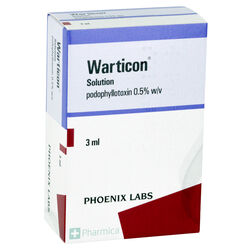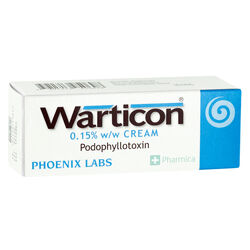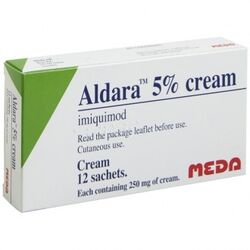
Genital warts are soft growths that develop around the genitals or anal region. They are caused by human papillomavirus (HPV), which is passed on predominantly during vaginal or anal sex.
The condition is one of the most common viral STIs (sexually transmitted infections) in the UK. Around 4 in 5 men and women will have HPV at some point in their lives.
Genital warts can be treated with a topical cream or solution, which can clear the warts and prevent them from returning.
This guide will explain what causes genital warts, how to spot the symptoms and what you can do to treat them.
Understanding genital warts
Genital warts, also known as venereal warts or condylomata acuminata, are small growths in the genital or anal area caused by HPV (human papillomavirus). HPV is responsible for causing warts all over the body, with more than 100 different types of the virus.
The warts are not always visible to the naked eye. They are usually under 5mm in size, but can range up to several centimetres. They are typically the same or a slightly darker shade than your skin colour, and can appear either separately or in clusters.
In women, genital warts can appear:
- on the vulva
- inside or outside of the vagina
- on the cervix
- inside the urethra
- inside or outside the anus
In men, genital warts can appear:
- on the penis (on the shaft, on or under the foreskin)
- on the scrotum
- inside the urethra
- inside or outside the anus
It is also possible, but unlikely, for genital warts to appear on the lips, tongue, mouth or throat if you have had oral sex with someone with the condition.
Genital warts do not usually cause symptoms, although they can occasionally be painful, cause itching and redness, and may bleed.
Since the warts can be difficult to spot externally, or internally on the urethra or cervix, it’s important you visit a sexual health clinic if you experience any of the following:
- 1 or more painless lumps or growths around the penis, vagina or anus
- an itching or burning sensation in the genital or anal areas
- bleeding from the genital or anal areas
- a change to the normal flow of urine, such as pointing sideways, that does not go away
- a bloody, brown, or watery vaginal discharge with an unpleasant odour
- a sexual partner has genital warts, regardless of whether you are experiencing symptoms
What causes genital warts?
Most cases of genital warts are caused by two types of HPV. However, there are more than 100 different types of HPV. Between 30 and 40 types can appear in the genital and anal areas.
HPV types 6 and 11 are responsible for 90% of genital warts cases, and cannot cause cancer.
Types 16 and 18 cause the majority of HPV-related cancers, including 70% of cervical cancers. These varieties do not produce genital warts.
How are genital warts transmitted?
The infection is transmitted through sexual contact, typically through penetrative vaginal or anal sex with a partner who has genital warts.
HPV can also be passed on by close skin-to-skin contact of the genital area, and very rarely passed to the lips, throat or mouth area by performing oral sex on an infected partner. Sharing sex toys with an infected partner may also pass on the infection.
When warts are present, it is more likely that the virus infection will be passed on, but it can still be transmitted to a partner after the warts have disappeared. It is also possible, but very unlikely, for a pregnant mother to pass the virus to their baby at birth if they have genital warts at the time [1].
You cannot spread genital warts from kissing, hugging, sharing towels or drinking from the same cups.
What are the risk factors?
If you are sexually active with someone who may have genital warts, there is a risk of infection. The condition is more common in people who:
- are under 30 years of age
- smoke
- have a weakened immune system
- are children of mothers who have had the infection during childbirth
How do I treat genital warts?
Sometimes your body will clear an outbreak of genital warts without treatment.
However, it is not uncommon for the infection to multiply and get worse without intervention. While genital warts may return in the future, treatment can clear the warts over time, which in turn will greatly reduce the risk of transmission.
Do not use treatments designed for warts on other parts of the body, such as on the hands or feet, as they will not be effective.
Do not take antibiotics, as genital warts are caused by a viral infection rather than a bacterial one.
The most appropriate treatment for you will depend on the size, location, and quantity of the genital warts.
Genital warts treatment
Podophyllin
Podophyllin contains a powerful antiviral plant extract called podophyllotoxin. It helps prevent the virus from spreading further, and usually clears genital warts in approximately four weeks.
Warticon is a popular branded version of podophyllin, available in both solution and cream form, that is both effective and fast-acting.
Warticon 0.5% Solution is a water-based treatment that should be applied directly to the warts using an applicator.
Warticon Cream contains a lower concentration of the active ingredient podophyllotoxin (0.15%), and is available in cream form so it can be more accurately applied with the fingers.
Imiquimod
Imiquimod is also a topical medication that helps the body fight HPV.
Imiquimod-based treatments like the popular Aldara Cream are ‘immune response modifiers’, meaning they stimulate the immune system to activate its natural defence mechanisms, allowing the body to clear HPV quicker.
Research has shown that while Warticon’s active ingredient causes faster clearance of genital warts, Aldara’s active ingredient is more effective at preventing their long term recurrence [2].
All three of these topical treatments share common side effects, which can include:
- wearing away of the top layers of the skin
- skin irritation including redness, itching, burning sensation
- skin ulcers, scabs, dry skin or skin discolouration
- minor pain or swelling
If any of the above symptoms become severe, stop using the solution immediately and seek medical attention.
| |
Warticon Solution |
Warticon Cream |
Aldara Cream |
| |
 |
 |
 |
| Pharmica price |
From £39.99 |
From £31.99 |
From £69.95 - 12 sachets each containing 250 mg (0.25g) |
| Recovery speed |
Up to 4 weeks |
Up to 4 weeks |
Between 4 and 16 weeks |
| Benefits over alternatives |
- Marginally greater efficacy
- Fast-acting |
- Easy to apply
- Fast-acting |
- Easy to apply
- More effective at preventing long term recurrence |
| Suitable during pregnancy? |
No |
No |
Unknown. There are no adequate or well-controlled studies in pregnant women, so we advise against use during pregnancy |
For application instructions, please refer to each of our genital warts treatments. Always read the patient information leaflet before use.
Cryotherapy
Cryotherapy is a medical procedure where liquid nitrogen is applied to the affected area, blistering the warts and causing them to fall off.
Cryotherapy is appropriate for external genital warts and has a very high success rate of 79%-88% [3]. There is a slight risk of scarring, with irritation and mild pain often occurring as a side effect of the procedure.
Laser surgery
Laser surgery is often considered as a last resort when it comes to treating genital warts when other treatments have been unsuccessful. Laser surgery may also be used if the infection is particularly widespread or if the infection needs to be treated during pregnancy.
This treatment has been found more successful than cryotherapy in preventing the recurrence of genital warts [4]. Like cryotherapy, it does not prevent further warts from forming in the future.
Similar side effects may be experienced, such as:
- mild pain
- itching
- shedding of dead skin
- potential scarring
Recovery time is usually between two and four weeks.
How do I prevent genital warts?
There are a number of measures you can take to reduce your chances of catching the HPV virus and developing genital warts. These include:
- avoiding sexual intercourse (even protected sex) with someone who has the infection. This eliminates the risk of transmission completely, as genital warts can be caught from affected skin around the genitals
- using a condom every time you have sex. As a sexually transmitted infection (STI), physical contraception drastically lowers the chances of contracting an infection
- checking potential sexual partners are clear of STIs before intercourse
- vaccinating against HPV
There is little evidence to support the efficacy of home remedies for genital warts.
Do not use generic wart treatment for genital warts, as they are not effective and can result in unwanted side effects.